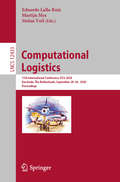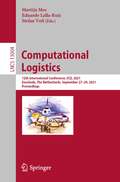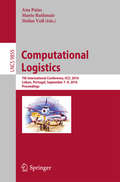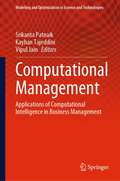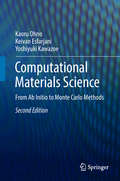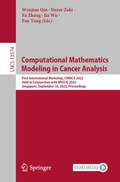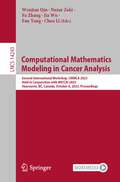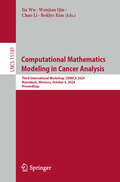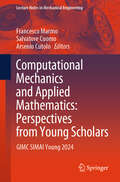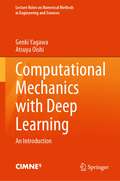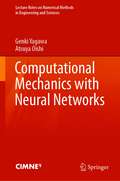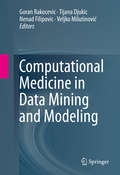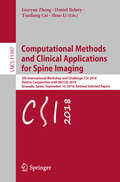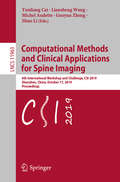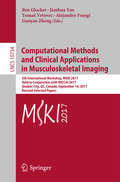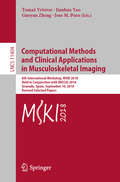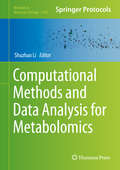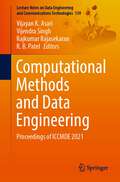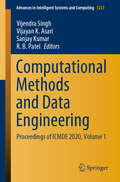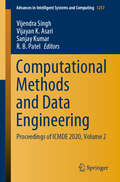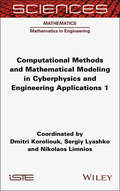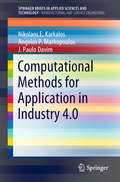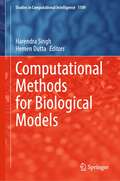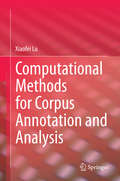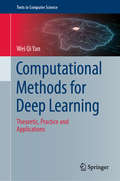- Table View
- List View
Computational Logistics: 11th International Conference, ICCL 2020, Enschede, The Netherlands, September 28–30, 2020, Proceedings (Lecture Notes in Computer Science #12433)
by Stefan Voß Eduardo Lalla-Ruiz Martijn MesThis book constitutes the proceedings of the 11th International Conference on Computational Logistics, ICCL 2020, held in Enschede, The Netherlands, in September 2020.The 49 papers included in this book were carefully reviewed and selected from 73 submissions. They were organized in topical sections named: maritime and port logistics; vehicle routing and scheduling; freight distribution and city logistics; network design and scheduling; and selected topics in logistics.Due to the Corona pandemic ICCL 2020 was held as a virtual event.
Computational Logistics: 12th International Conference, ICCL 2021, Enschede, The Netherlands, September 27–29, 2021, Proceedings (Lecture Notes in Computer Science #13004)
by Stefan Voß Eduardo Lalla-Ruiz Martijn MesThis book constitutes the refereed proceedings of the 12th International Conference on Computational Logistics, ICCL 2021, held in September 2021. Due to COVID-19 pandemic the conference was held virtually.The 42 full papers were carefully reviewed and selected from 111 submissions. They detail the interface of complex logistics systems and advanced computational methods from the fields of operations research, business analytics, and artificial intelligence. The papers are organized in topical sections named maritime and port logistics; supply chain and production management; urban transport and collaborative logistics; routing, dispatching, and scheduling; air logistics and multi-modal transport.
Computational Logistics: 7th International Conference, ICCL 2016, Lisbon, Portugal, September 7-9, 2016, Proceedings (Lecture Notes in Computer Science #9855)
by Ana Paias Mario Ruthmair Stefan VoßThis book constitutes the refereed proceedings of the 7th International Conference on Computational Logistics, ICCL 2016, held in Lisbon, Portugal, in September 2016. The 29 papers presented in this volume were carefully reviewed and selected for inclusion in the book. They are organized in topical sections entitled: container terminals and maritime transportation; intermodal transport; location and routing; (general) logistics and supply chain management.
Computational Management: Applications of Computational Intelligence in Business Management (Modeling and Optimization in Science and Technologies #18)
by Vipul Jain Srikanta Patnaik Kayhan TajeddiniThis book offers a timely review of cutting-edge applications of computational intelligence to business management and financial analysis. It covers a wide range of intelligent and optimization techniques, reporting in detail on their application to real-world problems relating to portfolio management and demand forecasting, decision making, knowledge acquisition, and supply chain scheduling and management.
Computational Materials Science: From Ab Initio To Monte Carlo Methods (Springer Series In Solid-state Sciences Ser. #129)
by Kaoru Ohno Keivan Esfarjani Yoshiyuki KawazoeThis textbook introduces modern techniques based on computer simulation to study materials science. It starts from first principles calculations enabling to calculate the physical and chemical properties by solving a many-body Schroedinger equation with Coulomb forces. For the exchange-correlation term, the local density approximation is usually applied. After the introduction of the first principles treatment, tight-binding and classical potential methods are briefly introduced to indicate how one can increase the number of atoms in the system. In the second half of the book, Monte Carlo simulation is discussed in detail. Problems and solutions are provided to facilitate understanding. Readers will gain sufficient knowledge to begin theoretical studies in modern materials research. This second edition includes a lot of recent theoretical techniques in materials research. With the computers power now available, it is possible to use these numerical techniques to study various physical and chemical properties of complex materials from first principles. The new edition also covers empirical methods, such as tight-binding and molecular dynamics.
Computational Mathematics Modeling in Cancer Analysis: First International Workshop, CMMCA 2022, Held in Conjunction with MICCAI 2022, Singapore, September 18, 2022, Proceedings (Lecture Notes in Computer Science #13574)
by Fan Yang Fa Zhang Jia Wu Nazar Zaki Wenjian QinThis book constitutes the proceedings of the First Workshop on Computational Mathematics Modeling in Cancer Analysis (CMMCA2022), held in conjunction with MICCAI 2022, in Singapore in September 2022. Due to the COVID-19 pandemic restrictions, the CMMCA2022 was held virtually. DALI 2022 accepted 15 papers from the 16 submissions that were reviewed. A major focus of CMMCA2022 is to identify new cutting-edge techniques and their applications in cancer data analysis in response to trends and challenges in theoretical, computational and applied aspects of mathematics in cancer data analysis.
Computational Mathematics Modeling in Cancer Analysis: Second International Workshop, CMMCA 2023, Held in Conjunction with MICCAI 2023, Vancouver, BC, Canada, October 8, 2023, Proceedings (Lecture Notes in Computer Science #14243)
by Fan Yang Chao Li Fa Zhang Jia Wu Nazar Zaki Wenjian QinThis volume LNCS 14243 constitutes the refereed proceedings of the Second International Workshop, CMMCA 2023, Held in Conjunction with MICCAI 2023, on October 8, 2023, in Vancouver, BC, Canada. The 17 full papers presented were carefully reviewed and selected from 25 submissions. The conference focuses on the discovery of cutting-edge techniques addressing trends and challenges in theoretical, computational, and applied aspects of mathematical cancer data analysis.
Computational Mathematics Modeling in Cancer Analysis: Third International Workshop, CMMCA 2024, Marrakesh, Morocco, October 6, 2024, Proceedings (Lecture Notes in Computer Science #15181)
by Chao Li Jia Wu Wenjian Qin Boklye KimThis book constitutes the refereed proceedings of Third International Workshop on Computational Mathematics Modeling in Cancer Analysis, CMMCA 2024, held in Marrakesh, Morocco, on October 6, 2024, in conjunction with MICCAI 2024. The 12 full papers presented in this book were carefully reviewed and selected from 14 submissions. CMMCA serves as a platform for collaboration among professionals in mathematics, engineering, computer science, and medicine, focusing on innovative mathematical methods for analyzing complex cancer data.
Computational Mechanics and Applied Mathematics: GIMC SIMAI Young 2024 (Lecture Notes in Mechanical Engineering)
by Francesco Marmo Salvatore Cuomo Arsenio CutoloThis book collects the latest advances and innovations in the field of applied mathematics and computational mechanics, as presented at the 2nd Workshop GIMC SIMAI YOUNG, held in Naples, Italy, on July 10–12, 2024. The workshop was the joint effort of Computational Mechanics Group of the Italian Association of Theoretical and Applied Mechanics -AIMETA (GIMC) and Italian Society of Applied and Industrial Mathematics (SIMAI) and was meant to highlight the works of young researchers in the field. Topics include mathematical models for socio-epidemiological dynamics, efficient numerical methods for evolutionary PDEs, multi-scale approaches and machine learning techniques in material modelling, nonlinear material behaviour, computational methods for shells and spatial structures, assessment, monitoring, and design of masonry structures, particles in numerical simulations, non-Newtonian complex fluids, mathematical modelling in mechanobiology and oncology, mechanics of biological systems and bioinspired materials, computational approaches for complex dynamical systems, optimization methods for classical and data-driven approaches. The contributions, which were selected by means of a rigorous peer-review process, present a wealth of exciting ideas that will open novel research directions and foster multidisciplinary collaboration.
Computational Mechanics with Deep Learning: An Introduction (Lecture Notes on Numerical Methods in Engineering and Sciences)
by Genki Yagawa Atsuya OishiThis book is intended for students, engineers, and researchers interested in both computational mechanics and deep learning. It presents the mathematical and computational foundations of Deep Learning with detailed mathematical formulas in an easy-to-understand manner. It also discusses various applications of Deep Learning in Computational Mechanics, with detailed explanations of the Computational Mechanics fundamentals selected there. Sample programs are included for the reader to try out in practice. This book is therefore useful for a wide range of readers interested in computational mechanics and deep learning.
Computational Mechanics with Neural Networks (Lecture Notes on Numerical Methods in Engineering and Sciences)
by Genki Yagawa Atsuya OishiThis book shows how neural networks are applied to computational mechanics. Part I presents the fundamentals of neural networks and other machine learning method in computational mechanics. Part II highlights the applications of neural networks to a variety of problems of computational mechanics. The final chapter gives perspectives to the applications of the deep learning to computational mechanics.
Computational Medicine in Data Mining and Modeling
by Veljko Milutinović Goran Rakocevic Tijana Djukic Nenad FilipovicThis book presents an overview of a variety of contemporary statistical, mathematical and computer science techniques which are used to further the knowledge in the medical domain. The authors focus on applying data mining to the medical domain, including mining the sets of clinical data typically found in patient's medical records, image mining, medical mining, data mining and machine learning applied to generic genomic data and more. This work also introduces modeling behavior of cancer cells, multi-scale computational models and simulations of blood flow through vessels by using patient-specific models. The authors cover different imaging techniques used to generate patient-specific models. This is used in computational fluid dynamics software to analyze fluid flow. Case studies are provided at the end of each chapter. Professionals and researchers with quantitative backgrounds will find Computational Medicine in Data Mining and Modeling useful as a reference. Advanced-level students studying computer science, mathematics, statistics and biomedicine will also find this book valuable as a reference or secondary text book.
Computational Methods and Clinical Applications for Spine Imaging: 5th International Workshop and Challenge, CSI 2018, Held in Conjunction with MICCAI 2018, Granada, Spain, September 16, 2018, Revised Selected Papers (Lecture Notes in Computer Science #11397)
by Guoyan Zheng Shuo Li Daniel Belavy Yunliang CaiThis book constitutes the refereed proceedings of the 5th International Workshop and Challenge on Computational Methods and Clinical Applications for Spine Imaging, CSI 2018, held in conjunction with MICCAI 2018, in Granada, Spain, in September 2018. The 8 full papers presented together with 8 short papers and 1 keynote were carefully reviewed and selected for inclusion in this volume. Papers on novel methodology and clinical research, and also papers which demonstrate the performance of methods on the provided challenges, the aim is to cover both theoretical and very practical aspects of computerized spinal imaging.
Computational Methods and Clinical Applications for Spine Imaging: 6th International Workshop and Challenge, CSI 2019, Shenzhen, China, October 17, 2019, Proceedings (Lecture Notes in Computer Science #11963)
by Guoyan Zheng Shuo Li Yunliang Cai Liansheng Wang Michel AudetteThis book constitutes the proceedings of the 7th International Workshop and Challenge on Computational Methods and Clinical Applications for Spine Imaging, CSI 2019, which was held in conjunction with MICCAI on October 17, 2019, in Shenzhen, China. All submissions were accepted for publication; the book contains 5 peer-reviewed regular papers, covering topics of vertrebra detection, spine segmentation and image-based diagnosis, and 9 challenge papers, investigating (semi-)automatic spinal curvature estimation algorithms and providing a standard evaluation framework with a set of x-ray images.
Computational Methods and Clinical Applications in Musculoskeletal Imaging: 5th International Workshop, MSKI 2017, Held in Conjunction with MICCAI 2017, Quebec City, QC, Canada, September 10, 2017, Revised Selected Papers (Lecture Notes in Computer Science #10734)
by Tomaž Vrtovec Jianhua Yao Ben Glocker Alejandro Frangi Guoyan ZhengThis book constitutes the refereed proceedings of the 5th International Workshop and Challenge on Computational Methods and Clinical Applications for Musculoskeletal Imaging, MSKI 2017, held in conjunction with MICCAI 2017, in Quebec City, QC, Canada, in September 2017. The 13 workshop papers were carefully reviewed and selected for inclusion in this volume. Topics of interest include all major aspects of musculoskeletal imaging, for example: clinical applications of musculoskeletal computational imaging; computer-aided detection and diagnosis of conditions of the bones, muscles and joints; image-guided musculoskeletal surgery and interventions; image-based assessment and monitoring of surgical and pharmacological treatment; segmentation, registration, detection, localization and visualization of the musculoskeletal anatomy; statistical and geometrical modeling of the musculoskeletal shape and appearance; image-based microstructural characterization of musculoskeletal tissue; novel techniques for musculoskeletal imaging.
Computational Methods and Clinical Applications in Musculoskeletal Imaging: 6th International Workshop, MSKI 2018, Held in Conjunction with MICCAI 2018, Granada, Spain, September 16, 2018, Revised Selected Papers (Lecture Notes in Computer Science #11404)
by Tomaž Vrtovec Jianhua Yao Guoyan Zheng Jose M. PozoThis book constitutes the refereed proceedings of the 6th International Workshop on Computational Methods and Clinical Applications for Musculoskeletal Imaging, MSKI 2018, held in conjunction with MICCAI 2018, in Granada, Spain, in September 2018. The 13 workshop papers were carefully reviewed and selected for inclusion in this volume. Topics of interest include all major aspects of musculoskeletal imaging, for example: clinical applications of musculoskeletal computational imaging; computer-aided detection and diagnosis of conditions of the bones, muscles and joints; image-guided musculoskeletal surgery and interventions; image-based assessment and monitoring of surgical and pharmacological treatment; segmentation, registration, detection, localization and visualization of the musculoskeletal anatomy; statistical and geometrical modeling of the musculoskeletal shape and appearance; image-based microstructural characterization of musculoskeletal tissue; novel techniques for musculoskeletal imaging.
Computational Methods and Data Analysis for Metabolomics (Methods in Molecular Biology #2104)
by Shuzhao LiThis book provides a comprehensive guide to scientists, engineers, and students that employ metabolomics in their work, with an emphasis on the understanding and interpretation of the data. Chapters guide readers through common tools for data processing, using database resources, major techniques in data analysis, and integration with other data types and specific scientific domains. Written in the highly successful Methods in Molecular Biology series format, chapters include introductions to their respective topics, practical guidance of methods and techniques, useful web supplements, and connect the steps from experimental metabolomics to scientific discoveries. Authoritative and cutting-edge, Computational Methods and Data Analysis for Metabolomics to ensure successful results in the further study of this vital field.
Computational Methods and Data Engineering: Proceedings of ICCMDE 2021 (Lecture Notes on Data Engineering and Communications Technologies #139)
by Vijendra Singh Vijayan K. Asari R. B. Patel Rajkumar RajasekaranThe book features original papers from International Conference on Computational Methods and Data Engineering (ICCMDE 2021), organized by School of Computer Science and Engineering, Vellore Institute of Technology, Vellore, Tamil Nadu, India, during November 25–26, 2021. The book covers innovative and cutting-edge work of researchers, developers, and practitioners from academia and industry working in the area of advanced computing.
Computational Methods and Data Engineering: Proceedings of ICMDE 2020, Volume 1 (Advances in Intelligent Systems and Computing #1227)
by Sanjay Kumar Vijendra Singh Vijayan K. Asari R. B. PatelThis book gathers selected high-quality research papers from the International Conference on Computational Methods and Data Engineering (ICMDE 2020), held at SRM University, Sonipat, Delhi-NCR, India. Focusing on cutting-edge technologies and the most dynamic areas of computational intelligence and data engineering, the respective contributions address topics including collective intelligence, intelligent transportation systems, fuzzy systems, data privacy and security, data mining, data warehousing, big data analytics, cloud computing, natural language processing, swarm intelligence, and speech processing.
Computational Methods and Data Engineering: Proceedings of ICMDE 2020, Volume 2 (Advances in Intelligent Systems and Computing #1257)
by Sanjay Kumar Vijendra Singh Vijayan K. Asari R. B. PatelThis book gathers selected high-quality research papers from the International Conference on Computational Methods and Data Engineering (ICMDE 2020), held at SRM University, Sonipat, Delhi-NCR, India. Focusing on cutting-edge technologies and the most dynamic areas of computational intelligence and data engineering, the respective contributions address topics including collective intelligence, intelligent transportation systems, fuzzy systems, data privacy and security, data mining, data warehousing, big data analytics, cloud computing, natural language processing, swarm intelligence, and speech processing.
Computational Methods and Mathematical Modeling in Cyberphysics and Engineering Applications 1
by Nikolaos Limnios Dmitri Koroliouk Sergiy LyashkoMathematical methods in engineering are characterized by a wide range of techniques for approaching various problems. Moreover, completely different analysis techniques can be applied to the same problem, which is justified by the difference in specific applications. Therefore, the study of the analyses and solutions of specific problems leads the researcher to generate their own techniques for the analysis of similar problems continuously arising in the process of technical development. Computational Methods and Mathematical Modeling in Cyberphysics and Engineering Applications contains solutions to specific problems in current areas of computational engineering and cyberphysics.
Computational Methods for Application in Industry 4.0 (SpringerBriefs in Applied Sciences and Technology)
by J. Paulo Davim Angelos P. Markopoulos Nikolaos E. KarkalosThis book presents computational and statistical methods used by intelligent systems within the concept of Industry 4.0. The methods include among others evolution-based and swarm intelligence-based methods. Each method is explained in its fundamental aspects, while some notable bibliography is provided for further reading. This book describes each methods' principles and compares them. It is intended for researchers who are new in computational and statistical methods but also to experienced users.
Computational Methods for Biological Models (Studies in Computational Intelligence #1109)
by Hemen Dutta Harendra SinghThis book discusses computational methods related to biological models using mathematical tools and techniques. The book chapters concentrate on numerical and analytical techniques that provide a global solution for biological models while keeping long-term benefits in mind. The solutions are useful in closely understanding biological models, and the results will be very useful for mathematicians, engineers, doctors, scientists and researchers working on real-life biological models. This book provides significant and current knowledge of biological models related to real-life applications. The book covers both methods and applications.
Computational Methods for Corpus Annotation and Analysis
by Xiaofei LuIn the past few decades the use of increasingly large text corpora has grown rapidly in language and linguistics research. This was enabled by remarkable strides in natural language processing (NLP) technology, technology that enables computers to automatically and efficiently process, annotate and analyze large amounts of spoken and written text in linguistically and/or pragmatically meaningful ways. It has become more desirable than ever before for language and linguistics researchers who use corpora in their research to gain an adequate understanding of the relevant NLP technology to take full advantage of its capabilities. This volume provides language and linguistics researchers with an accessible introduction to the state-of-the-art NLP technology that facilitates automatic annotation and analysis of large text corpora at both shallow and deep linguistic levels. The book covers a wide range of computational tools for lexical, syntactic, semantic, pragmatic and discourse analysis, together with detailed instructions on how to obtain, install and use each tool in different operating systems and platforms. The book illustrates how NLP technology has been applied in recent corpus-based language studies and suggests effective ways to better integrate such technology in future corpus linguistics research. This book provides language and linguistics researchers with a valuable reference for corpus annotation and analysis.
Computational Methods for Deep Learning: Theoretic, Practice and Applications (Texts in Computer Science)
by Wei Qi YanIntegrating concepts from deep learning, machine learning, and artificial neural networks, this highly unique textbook presents content progressively from easy to more complex, orienting its content about knowledge transfer from the viewpoint of machine intelligence. It adopts the methodology from graphical theory, mathematical models, and algorithmic implementation, as well as covers datasets preparation, programming, results analysis and evaluations.Beginning with a grounding about artificial neural networks with neurons and the activation functions, the work then explains the mechanism of deep learning using advanced mathematics. In particular, it emphasizes how to use TensorFlow and the latest MATLAB deep-learning toolboxes for implementing deep learning algorithms.As a prerequisite, readers should have a solid understanding especially of mathematical analysis, linear algebra, numerical analysis, optimizations, differential geometry, manifold, and information theory, as well as basic algebra, functional analysis, and graphical models. This computational knowledge will assist in comprehending the subject matter not only of this text/reference, but also in relevant deep learning journal articles and conference papers.This textbook/guide is aimed at Computer Science research students and engineers, as well as scientists interested in deep learning for theoretic research and analysis. More generally, this book is also helpful for those researchers who are interested in machine intelligence, pattern analysis, natural language processing, and machine vision.Dr. Wei Qi Yan is an Associate Professor in the Department of Computer Science at Auckland University of Technology, New Zealand. His other publications include the Springer title, Visual Cryptography for Image Processing and Security.
